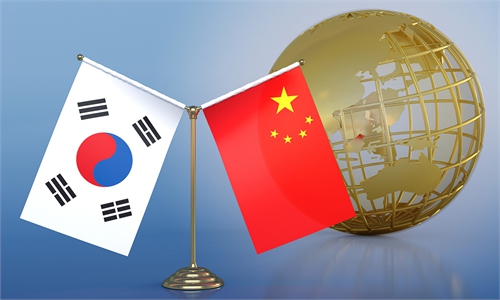Quad won’t pose much of an encircling threat to China with or without South Korea

President-elect Yoon Suk-yeol speaks during a press conference at the National Assembly Library in Seoul, South Korea, March 10, 2022. Yoon Suk-yeol of the main conservative opposition People Power Party won a narrow victory in the South Korean presidential election amid people's aspiration for transfer of power. (Photo by James Lee/Xinhua)
South Korean President-elect, Yoon Suk-yeol, said that he will "positively review" the country's joining of the Quadrilateral Security Dialogue (Quad) if invited, despite having low expectations of being invited any time soon, Korean news agency Yonhap reported on Tuesday.Yoon is trying to send mainly two signals through his remarks. On one hand, he is showing his determination to strengthen South Korea-US relations, a commitment he has been making since his election campaign. On the other hand, Yoon's statement is testing the reaction of the international community. In particular, Seoul is curious about how Beijing will react if South Korea becomes a member of the Quad, an alliance of four Asia-Pacific nations that aim to encircle China. In this way, South Korea could know where China's bottom line lies.
It is possible for South Korea to join the Quad, as Yoon has clamored in his election campaign. But no matter what kind of organization South Korea joins, Seoul cannot touch Beijing's bottom line. Therefore, if South Korea joins the quadrilateral mechanism to contain China in areas, including military, politics, and diplomacy, it will go beyond the China-South Korea strategic and cooperative partnership to undermine China's interests. We will not allow that to happen.
Meanwhile, as Yoon has expressed his willingness to cooperate with China after winning the election, it is more important now to observe what attitude and actions his administration will take toward China after he officially takes office on May 10.
However, even if Seoul eventually does join the Quad, it will not have much of a role to play in it. In fact, the security dialogue will not pose much of an encircling threat to China with or without South Korea. In my opinion, South Korea could become a bigger loser if it really becomes a Quad member. It will suffer a huge loss in terms of global credibility if it insists on damaging relations with China. I think South Korean politicians will for sure think twice about it and will not make such a move easily.
If South Korea joins the alliance, it will likely become a variable factor similar to India. But given the US-South Korea military alliance, Washington views Seoul and New Delhi in different ways. Thus, it may desperately pull South Korea into the Quad to partially resist "centrifugal forces" from India.
Moreover, Washington has been quite dissatisfied with Seoul for not taking sides. For that reason, Washington will possibly make greater efforts to make Yoon's administration lean to its side, either through coercion or promises of benefits.
The Quad is obviously targeting China. With such a strong purpose, I do not think the grouping will have much room to expand. After all, there are not many countries willing to be closely tied to the US chariot and become a cat's-paw for Washington. Besides South Korea, countries like Vietnam are also the targets of the US in the expansion of the Quad but they will not join such an alliance willingly to make China their enemy.
At the same time, the Quad's capabilities are actually limited. Two of the current Quad members, Japan and India, have their own interests and calculations. India has already shown its inconsistency with the US on the issue of the Russia-Ukraine conflict. Japan, on one hand, is following the US, but on the other it is also taking into account its relations and cooperation with China. As a result, Tokyo will not completely act as a pawn of Washington.
In the end, only Australia screams the anti-China war cry together with the US. We have to pay full attention to the Quad's intentions to contain China and be on guard even though the group is nothing significant in terms of power. The Quad is nothing to be afraid of, not even if it expands.
The author is professor and Director of the Institute of the US and East Asian Studies at Liaoning University. opinion@globaltimes.com.cn


